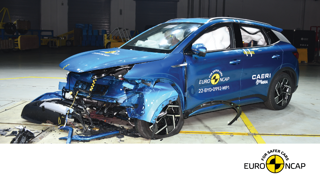In-car telematics are being championed as a new way to enhance the long-term service, maintenance and repair relationship between drivers and dealers.
In-Car Cleverness, a white label telematics product, has been developed with £1 million investment from Accident Exchange Group.
It uses a unit called OnBoard fitted to cars.
OnBoard continually monitors the car allowing the dealer to act upon faults or problems. If a vehicle develops an engine problem, headlight failure, electrical fault, breaks-down, has an accident or begins to suffer from excessive tyre wear, the dealer will made aware. The technology operates via sensors and OEM-supported links to ECUs.
“This provides powerful data that gives the dealer accurate, remote intelligence they’ve never had,” said Steve Evans, chief executive of In-Car Cleverness. “It will change forever the relationship between dealer and customer. It allows them to speak before a fault becomes an inconvenience."
A number of dealer groups, Evans said, are finalising plans to roll-out In-Car Cleverness.
"From a marketing perspective, the days of the MoT, annual service scattergun mass emailing, texting, cold calling and direct mailing are numbered.
"By unlocking the intelligence in modern vehicles, OnBoard allows the dealer to introduce real-time, personalised customer relationship management. This means they no longer need to be strangers between visits and helps them tackle the risk of losing the customer to independent workshops."
Drivers can also have a range of ‘dealer branded’ tools and services that help them reduce their motoring costs (e.g. cheapest fuel location, journey and driving style analysis reports to improve fuel economy) and protect their vehicle (e.g. 'track and trace theft recovery').
For dealer groups, it provides senior management with not only the lifetime revenue of the entire customer car parc, but how individual sites are performing on the workshop absorption and CRM opportunities presented by the technology, Evans said.
The OnBoard device includes:
* Lifetime revenue visibility of the customer car parc
* Remote vehicle diagnostics providing fixed and condition based (including engine management, diesel particulate filter condition and tyre wear) alerts
* Customisable reporting and dashboards for individual dealers and comparative service absorption for dealer groups
* Automatic collision notification: crash detection supported by a 24/7 emergency response
* Driver focussed benefits include bCall (breakdown alert, recovery and assistance) and cheap fuel location notification and ‘track and trace’ vehicle theft recovery.
OnBoard can be fitted to any model built since 2002. It has been developed after 250 million miles of R&D testing.
The product is also being offered to leasing companies, rental companies and drivers.




















john Smecker - 30/11/2012 15:18
If connected to the ECU would you have to go through the OBD ??? What is the question that we get asked most by customers and prospects? Well, there are many, but a common question that highlights a growing concern with ever increasing fuel costs is “how do I accurately measure my individual vehicle fuel consumption?” With the advent of On Board Diagnostics (OBD) in the 1980s the problem was solved, right? OBD, in an automotive context, is a generic term referring to a vehicle’s self-diagnostic and reporting capability. All vehicle manufacturers conform to SAE J1979 and the OBD-II standard has been mandatory for all cars and light trucks sold in the United States since 1996, and the EOBD standard has been mandatory for all petrol vehicles sold in the European Union since 2001 and all diesel vehicles since 2004. Problem solved! We just connect to the vehicle OBD port (they all have one) and read the fuel consumption data, right? Wrong…..it’s not that simple, it’s complicated and fraught with pitfalls. Each vehicle manufacturer implements the standard uniquely and will rarely, if ever, share that standard outside their service network. It’s possible to gain access to that standard and implement a solution to read the (Parameter Identification Numbers) PID codes, but manufacturers are not required to implement all PIDs listed in J1979 and they are allowed to include proprietary PIDs that are not listed. It’s just a minefield to attempt to interpret individual manufacturer PIDs accurately. Most importantly, non-approved connections to a vehicle OBD port could invalidate warranty and cause other legal or technical issues. Modern vehicles are controlled by highly sophisticated computer systems and can detect miniscule unexpected current draws and may register a fault. What if you have a mixture of old and new vehicles, cars, vans, buses from different manufacturers? Older vehicles won’t have any OBD port at all. Many after-market telematics providers will claim that they have solved the OBD connectivity problem. Not so! If you question their claims carefully, you will find that none of the issues outlined above have been solved satisfactorily and fuel consumption and mileage data accuracy will be highly suspect. GreenRoad does NOT connect to the vehicle ECM. Our unique approach to driver performance management requires that our in vehicle unit (IVU) be entirely self-contained and not rely on any vehicle manufacturer provided diagnostics, thus ensuring consistency and accuracy across a range of vehicle ages, types and manufacturer. We didn’t do this because it was easy. We did it (in the words of a former US president) because it was hard! We did it because without a fully self contained IVU, you CANNOT build a world class driver performance solution. So, back to the original question! How can we measure fuel consumption accurately? How can we prove the efficacy of the GreenRoad driver performance solution? Well the answer is most certainly NOT to be found by non-approved connection to a vital vehicle diagnostics system. Leave that to your approved vehicle service provider. The answer lies in going back to the source i.e. accurate measurement of actual fuel that is pumped into the vehicle tank and accurate measurement of vehicle mileage. The good news is that, whether you “bunker” your fuel or use fuel cards, GreenRoad can work with you to build a solution, using our GPS derived mileage and location data, that will truly give you the markets most accurate fuel consumption data by vehicle and by driver. As one customer said to me in exasperation as he studied wildly inaccurate fuel consumption reports from a telematics vendor “it’s not what you know, it’s what you can prove that counts” Talk to GreenRoad and we will help you prove what we already know about the fuel consumption benefits of our driver performance solution.